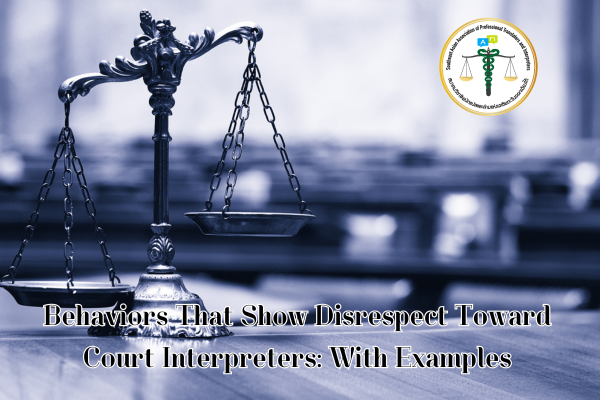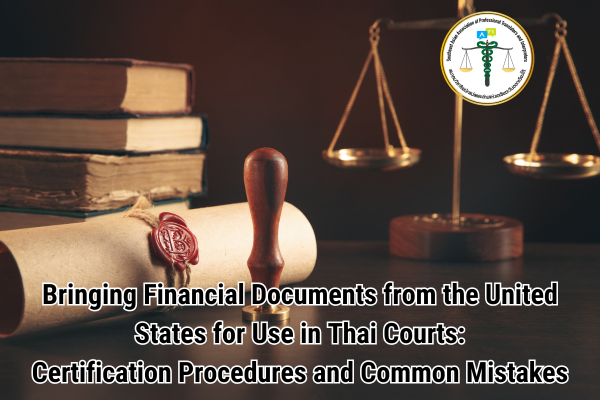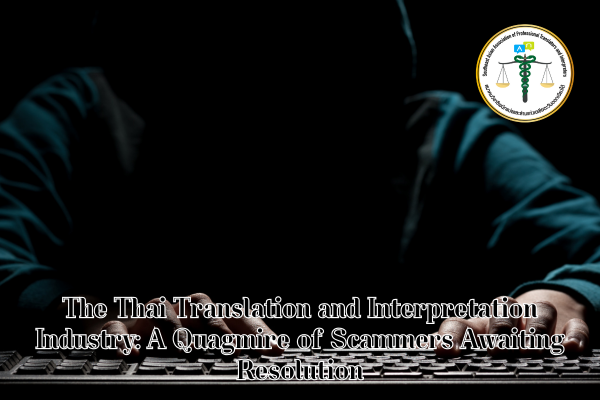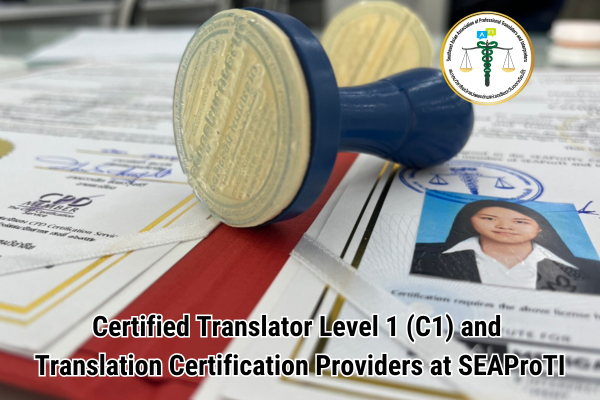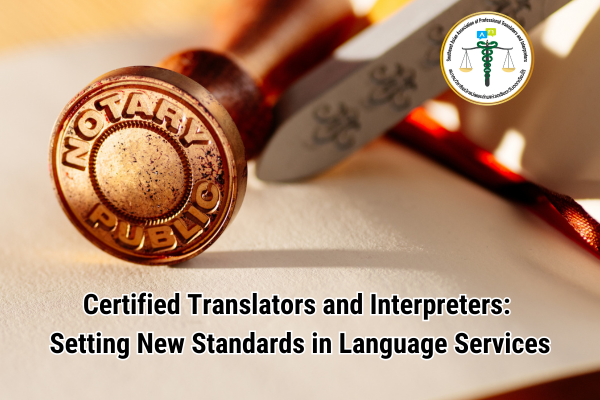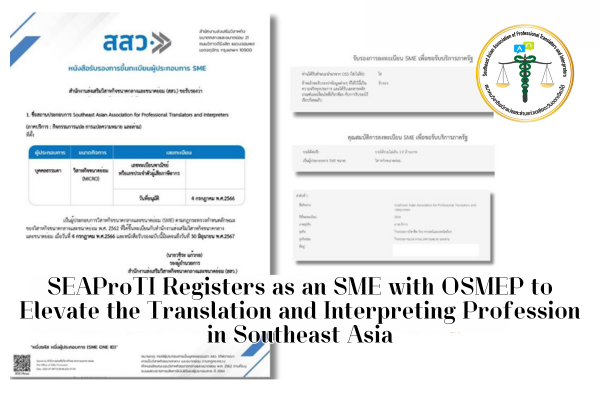Behaviors That Show Disrespect Toward Court Interpreters
23 March 2025, Bangkok – Court interpreters play a vital role in ensuring access to justice, particularly for individuals who do not fully understand or speak the language used in legal proceedings. By faithfully and impartially conveying spoken and signed language, interpreters enable defendants, witnesses, and other parties to participate meaningfully in the judicial process.
Despite their essential function, court interpreters are sometimes subjected to disrespectful treatment by individuals in the courtroom—including legal professionals, court staff, or even parties to a case. These behaviors hinder interpreters’ ability to do their jobs and may infringe upon the rights of those who depend on interpreting services.
This article explores common behaviors that constitute disrespect toward court interpreters, explains why they are problematic and offers real-life examples for awareness and reflection.
1. Using Dismissive or Derogatory Language
One of the most overt forms of disrespect is belittling language, which diminishes the interpreter’s professional role. Some typical comments include:
- “You’re just translating. It’s not that hard.”
- “We don’t need a full translation—just summarize.”
- “Don’t worry about interpreting everything. They won’t understand anyway.”
Example:
In a criminal case involving a Burmese defendant, a judge was overheard saying, “Just give them the gist—no need for word-for-word interpretation. They probably won’t get it anyway.” This undermined the interpreter’s role and reflected a prejudiced view of the defendant’s capacity to comprehend legal proceedings.
2. Preventing Interpreters from Performing Their Duties Effectively
Interpreters require full and clear access to everything spoken in the courtroom. Behaviors that impede this access include:
- Speaking too quickly without pauses for interpretation.
- Turning away from the interpreter while speaking or speaking in a low voice.
- Refusing the interpreter’s requests for repetition or clarification.
Example:
During witness testimony, a prosecutor used rapid speech with dense legal jargon. When the interpreter asked for clarification, the prosecutor replied, “If you’re a real interpreter, you should already know this,” discouraging the interpreter from seeking the accuracy required for fair interpretation.
3. Treating Interpreters as Invisible or Excluding Them from the Process
Courtroom arrangements should allow interpreters to hear and see all participants. Additionally, interpreters should be acknowledged as professionals contributing to the process, not sidelined or overlooked.
- Not providing a designated seat for the interpreter.
- Failing to inform interpreters of hearing rescheduled.
- Not recording the interpreter’s name in official court records.
Example:
In one trial, the interpreter was placed at the back of the courtroom, far from the defendant. When the defendant, who spoke softly, responded to questions, the interpreter had to walk closer to hear clearly—only to be reprimanded by the judge for being “disruptive,” despite the necessity of the action.
4. Attempting to Undermine Interpreter Impartiality
Impartiality is a core principle in court interpreting. Efforts to influence interpreters or pressure them to favor one side are both unethical and dangerous to the fairness of the proceedings.
- Asking the interpreter to “persuade” the defendant to plead guilty.
- Instructing the interpreter to “tone down” or “reframe” a witness’s statement.
- Offering gifts or benefits in exchange for special treatment.
Example:
In a pretrial meeting, a police officer asked the interpreter to encourage the witness to “reconsider” their statement, allegedly for their safety. The interpreter refused and reported the incident. This attempt to use the interpreter to manipulate the testimony clearly violated ethical standards.
5. Mocking or Pressuring the Interpreter During Mistakes or Clarifications
Even the most experienced interpreters may occasionally need to ask for clarification, especially when dealing with technical terms or unclear speech. Responding to these moments with sarcasm or ridicule is inappropriate.
Example:
During a trial involving technical engineering terms, the interpreter politely asked the expert witness to explain a term. A lawyer responded loudly in court: “Unbelievable! The interpreter doesn’t even know that?”—causing embarrassment and undermining the interpreter’s credibility in front of the court.
6. Instructing Interpreters to Omit or Condense Content
Interpreters are ethically bound to render all utterances fully and faithfully. Telling them to summarize or selectively translate jeopardizes the completeness and accuracy of the record.
Example:
In a labor dispute case, the judge told the interpreter: “Don’t bother interpreting the cross-examination questions—just translate the answers.” The interpreter attempted to explain the importance of full interpretation but was dismissed as “too fussy.”
Summary
Disrespect toward court interpreters can manifest in various ways—from verbal insults and obstructive behavior to attempts to compromise neutrality or exclude interpreters from essential communication. Such conduct does not merely harm the interpreter—it can violate the rights of limited English-proficient individuals and disrupt the integrity of the judicial process.
Respecting interpreters as skilled professionals is not only a matter of courtesy but a prerequisite for due process and equal access to justice. Legal professionals, judges, and court personnel should be trained to understand the role of interpreters, collaborate effectively, and foster a courtroom environment that allows interpreters to perform their duties without undue pressure or interference.
Final Note
Raising awareness about respectful conduct toward interpreters is critical to improving courtroom practice. Professional interpreter associations and court administrators may consider distributing posters or checklists titled “Best Practices for Working with Court Interpreters” and implementing complaint mechanisms when interpreters face mistreatment.
SEAProTI’s certified translators, translation certification providers, and certified interpreters:
The Southeast Asian Association of Professional Translators and Interpreters (SEAProTI) has officially announced the criteria and qualifications for individuals to register as “Certified Translators,” “Translation Certification Providers,” and “Certified Interpreters” under the association’s regulations. These guidelines are detailed in Sections 9 and 10 of the Royal Thai Government Gazette, issued by the Secretariat of the Cabinet under the Office of the Prime Minister of the Kingdom of Thailand, dated July 25, 2024, Volume 141, Part 66 Ng, Page 100.
To read the full publication, visit the Royal Thai Government Gazette
การกระทำที่ถือว่าไม่ให้เกียรติล่ามในห้องพิจารณาคดี
23 มีนาคม 2568, กรุงเทพมหานคร – ล่ามในห้องพิจารณาคดีมีบทบาทสำคัญในกระบวนการยุติธรรม โดยเฉพาะในกรณีที่คู่ความ ผู้ต้องหา พยาน หรือบุคคลใดบุคคลหนึ่งไม่สามารถใช้ภาษาที่ศาลใช้ในการพิจารณาคดีได้อย่างมีประสิทธิภาพ ล่ามจึงทำหน้าที่เป็น “สื่อกลางทางภาษา” ที่ถ่ายทอดสารอย่างครบถ้วน ถูกต้อง และเป็นกลาง เพื่อให้ผู้ที่เกี่ยวข้องมีโอกาสรับรู้ เข้าใจ และมีส่วนร่วมในกระบวนการยุติธรรมอย่างเท่าเทียม
อย่างไรก็ตาม ยังพบว่ามีบุคคลบางกลุ่มในห้องพิจารณาคดีที่ไม่เข้าใจบทบาทของล่าม หรือแสดงพฤติกรรมที่ไม่ให้เกียรติล่าม ซึ่งอาจส่งผลเสียต่อการทำงานของล่าม และที่สำคัญกว่านั้นคืออาจกระทบต่อสิทธิของผู้ที่พึ่งพาบริการล่ามในคดีความนั้น ๆ
ในบทความนี้ เราจะพิจารณาว่าการกระทำใดบ้างที่ถือว่า “ไม่ให้เกียรติล่ามในห้องพิจารณาคดี” พร้อมทั้งยกตัวอย่างประกอบ เพื่อใช้เป็นแนวทางสร้างความตระหนักรู้และส่งเสริมการปฏิบัติต่อผู้ปฏิบัติหน้าที่ล่ามอย่างเหมาะสม
1. พูดจาดูหมิ่น หรือลดทอนคุณค่าของล่าม
การใช้ถ้อยคำที่แสดงถึงการไม่ให้เกียรติ หรือดูหมิ่นความสามารถของล่าม เป็นหนึ่งในพฤติกรรมที่พบได้บ่อย เช่น:
- “แค่แปล จะยากอะไรนักหนา”
- “ล่ามก็แค่คนถ่ายทอดคำ ไม่ต้องมายุ่งกับเนื้อหาคดี”
- “ไม่ต้องแปลหมดหรอก เอาแค่ใจความก็พอ”
ตัวอย่าง:
ในคดีหนึ่งที่มีจำเลยเป็นชาวเมียนมา ผู้พิพากษาพูดกับล่ามว่า “ไม่ต้องแปลละเอียดหรอก พวกนี้คงไม่เข้าใจอยู่แล้ว” เป็นการดูถูกทั้งตัวล่ามและผู้รับการแปล อีกทั้งยังขัดต่อหลักสิทธิมนุษยชนอย่างชัดเจน
2. ไม่ให้โอกาสล่ามทำหน้าที่อย่างเหมาะสม
ล่ามจำเป็นต้องได้ยินและเข้าใจทุกสิ่งที่พูดในห้องพิจารณาคดี เพื่อถ่ายทอดเนื้อหาได้อย่างถูกต้อง การไม่เปิดโอกาสให้ล่ามฟังครบถ้วนถือเป็นอุปสรรค เช่น:
- พูดเร็วเกินไปโดยไม่เว้นช่วงให้ล่ามแปล
- พูดขณะหันหลังให้ล่าม หรือพูดเบาจนล่ามไม่ได้ยิน
- ไม่อนุญาตให้ล่ามขอทวนคำ หรือขอให้คู่ความพูดใหม่เมื่อไม่ชัดเจน
ตัวอย่าง:
ในการสืบพยานคดีหนึ่ง ทนายความฝ่ายโจทก์ตั้งใจใช้ศัพท์กฎหมายเฉพาะจำนวนมากโดยไม่ชี้แจงให้ล่ามเข้าใจ เมื่อถูกขอให้ทวนคำ กลับตอบว่า “ก็ไปศึกษาเอาสิ ถ้าเป็นล่ามจริงต้องรู้” ซึ่งไม่เป็นธรรมต่อล่ามและส่งผลให้ผู้ฟังปลายทางเข้าใจผิด
3. ปฏิบัติต่อล่ามเหมือนไม่มีตัวตน หรือไม่ให้ที่ยืนในกระบวนการ
ล่ามควรได้รับการจัดวางในตำแหน่งที่สามารถได้ยินและเห็นคู่สนทนาได้อย่างชัดเจน รวมถึงควรได้รับการปฏิบัติในฐานะมืออาชีพในกระบวนการยุติธรรม ไม่ใช่เพียง “บุคคลประกอบฉาก” เช่น:
- ไม่มีที่นั่งให้ล่าม หรือให้นั่งห่างจนไม่ได้ยิน
- ไม่แจ้งให้ล่ามทราบเมื่อมีการเลื่อนนัดพิจารณา
- ไม่บันทึกชื่อล่ามลงในกระบวนการพิจารณาคดีหรือในเอกสารอย่างเป็นทางการ
ตัวอย่าง:
ในการพิจารณาคดีหนึ่ง เจ้าหน้าที่ศาลจัดที่นั่งล่ามไว้หลังสุดของห้อง และจำเลยพูดเสียงเบามาก ล่ามต้องลุกขึ้นเดินไปใกล้จำเลยระหว่างศาลดำเนินคดี ซึ่งทำให้ถูกตำหนิว่า “ไม่สำรวม” ทั้งที่เป็นความจำเป็นเพื่อให้แปลได้แม่นยำ
4. พยายามแทรกแซงความเป็นกลางของล่าม
ล่ามต้องมีความเป็นกลางและไม่ฝักใฝ่ฝ่ายใด การพยายามชักชวนล่ามให้เข้าข้าง หรือสื่อสารเป็นการส่วนตัวกับล่ามนอกกระบวนการ ถือเป็นการละเมิดจริยธรรม เช่น:
- ขอให้ล่าม “ช่วยพูดให้จำเลยเข้าใจว่าควรสารภาพ”
- พูดกับล่ามว่า “แปลให้เขาเข้าใจแบบที่เราต้องการ”
- ให้ของขวัญหรือสัญญาผลประโยชน์กับล่ามนอกห้องพิจารณา
ตัวอย่าง:
มีกรณีที่พนักงานสอบสวนขอให้ล่ามพูดกับพยานให้ “เปลี่ยนคำให้การ” โดยอ้างว่า “เพื่อความปลอดภัย” ซึ่งล่ามได้ปฏิเสธและรายงานต่อเจ้าหน้าที่ศาลอย่างถูกต้อง ถือเป็นตัวอย่างของล่ามที่มีจรรยาบรรณ และพฤติกรรมของเจ้าหน้าที่นั้นถือว่าละเมิดอย่างร้ายแรง
5. หัวเราะ เยาะเย้ย หรือกดดันล่ามเมื่อเกิดความผิดพลาด
แม้ล่ามจะเตรียมตัวมาดีเพียงใด ก็อาจมีช่วงเวลาที่ต้องขอทวนคำ ขอให้พูดช้า หรือแปลผิดในบางประเด็น เมื่อเกิดกรณีเช่นนี้ การตอบสนองที่เหมาะสมคือให้โอกาสล่ามปรับตัว ไม่ใช่แสดงท่าทีล้อเลียนหรือกดดัน
ตัวอย่าง:
ระหว่างการแปลถ้อยคำที่เกี่ยวข้องกับศัพท์เฉพาะทางด้านวิศวกรรม ล่ามคนหนึ่งขอให้วิศวกรพยานอธิบายเพิ่มเติม แต่ทนายความกลับพูดต่อหน้าศาลว่า “ไม่คิดว่าล่ามจะไม่รู้คำง่าย ๆ แบบนี้” ซึ่งทำให้ล่ามรู้สึกอับอายและเสียขวัญในการทำหน้าที่
6. บังคับให้ล่ามสรุปหรือแปลไม่ครบถ้วน
หน้าที่ของล่ามคือถ่ายทอดทุกสิ่งที่พูดในห้องพิจารณาอย่างครบถ้วน การบังคับให้ล่าม “ย่อให้” หรือ “ตัดบางส่วน” ออก ถือเป็นการแทรกแซงการทำงานของล่าม และอาจทำให้ข้อมูลสูญหายหรือคลาดเคลื่อน
ตัวอย่าง:
ในคดีแรงงานแห่งหนึ่ง ผู้พิพากษาขอให้ล่ามแปลเฉพาะคำตอบสั้น ๆ ของจำเลย โดยไม่ต้องแปลคำถามของทนายฝ่ายตรงข้าม ล่ามได้อธิบายว่าการทำเช่นนั้นจะทำให้จำเลยไม่เข้าใจบริบททั้งหมด แต่กลับถูกตำหนิว่า “พูดมาก”
สรุป
พฤติกรรมที่ไม่ให้เกียรติล่ามในห้องพิจารณาคดีมีได้หลายรูปแบบ ตั้งแต่คำพูดที่แฝงอคติ การกระทำที่ปิดกั้นการทำหน้าที่ ไปจนถึงเจตนาที่แทรกแซงความเป็นกลางของล่าม การเคารพบทบาทของล่ามไม่เพียงเป็นการปฏิบัติตามหลักวิชาชีพ แต่ยังเป็นหัวใจสำคัญของการคุ้มครองสิทธิมนุษยชนและหลักนิติธรรมในกระบวนการยุติธรรม
การส่งเสริมความเข้าใจที่ถูกต้องเกี่ยวกับบทบาทของล่าม จึงเป็นสิ่งจำเป็น ทั้งในหมู่ผู้พิพากษา ทนายความ พนักงานสอบสวน และเจ้าหน้าที่ทุกฝ่าย เพื่อให้การพิจารณาคดีเป็นไปอย่างยุติธรรม ครบถ้วน และมีประสิทธิภาพ
เกี่ยวกับนักแปลรับรอง ผู้รับรองการแปล และล่ามรับรองของสมาคมวิชาชีพนักแปลและล่ามแห่งเอเชียตะวันออกเฉียงใต้
สมาคมวิชาชีพนักแปลและล่ามแห่งเอเชียตะวันออกเฉียงใต้ (SEAProTI) ได้ประกาศหลักเกณฑ์และคุณสมบัติผู้ที่ขึ้นทะเบียนเป็น “นักแปลรับรอง (Certified Translators) และผู้รับรองการแปล (Translation Certification Providers) และล่ามรับรอง (Certified Interpreters)” ของสมาคม หมวดที่ 9 และหมวดที่ 10 ในราชกิจจานุเบกษา ของสำนักเลขาธิการคณะรัฐมนตรี ในสำนักนายกรัฐมนตรี แห่งราชอาณาจักรไทย ลงวันที่ 25 ก.ค. 2567 เล่มที่ 141 ตอนที่ 66 ง หน้า 100 อ่านฉบับเต็มได้ที่: นักแปลรับรอง ผู้รับรองการแปล และล่ามรับรอง


